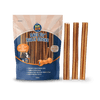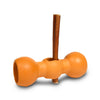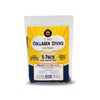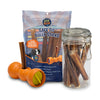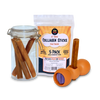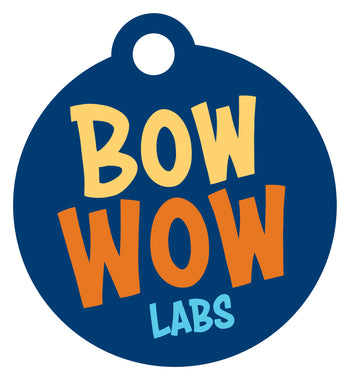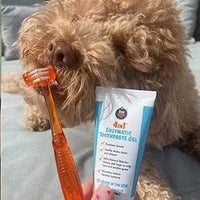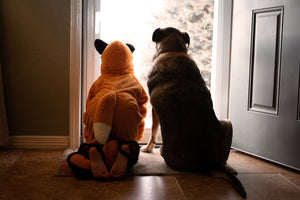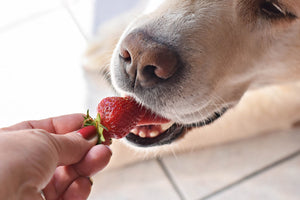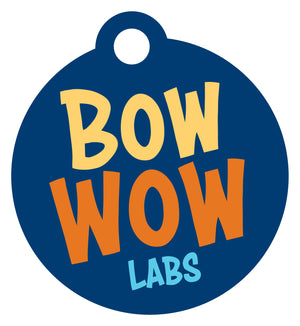In addition to being the Director of Nutrition and Wellness for Bow Wow Labs, I am also the owner of an award-winning, independent pet store as well as a certified pet nutritionist. Because of this, I am frequently sought after for advice regarding dogs and their nutrition-related health issues. Just last week a line of customers 10 deep was waiting to chat with me about nutrition-related ailments affecting their pups. One owner was concerned about her dog’s coat, another about weight gain, another about diarrhea.
But when I ask questions to try to flesh out a possible cause — changes to the dog’s food, new treats, supplements, or environmental changes — the response is often, “I don’t know or I don’t think so.”

Taking a whole-health approach
A nutrient deficiency and/or ingredient intolerance can show itself in many ways in a dog’s body. Because of this, pet parents frequently overlook their dog’s diet as a possible cause.
I often find that switching to a diet that is minimally processed and supplemented with whole food is the key to solving most nutrition-based problems. In some cases, dietary modifications aren’t needed and additional sleuthing is required. It could be your dog is getting highly nutritious food, but issues still arise. In this case, the best thing you can do is investigate.
I am really good at asking questions—sometimes I may ask too many—but the questions I ask are intended to lead to answers that help me look at the dog in front of me in a holistic way.
One of my goals is to teach pet parents to look at their dogs differently. Analyzing everything that goes into our dog’s body and becoming acutely aware of their environment can provide clues that help lead us to the answers we want.
You Recall What You Record
We all think we can remember changes in our surroundings, modifications to our diet, new treats we’ve introduced, and other subtle details. And though some of us may be able to do this, most of us can’t remember any of the above from last week … never mind from last month.
Would you remember the day your pup went swimming in a new watering hole, ate grass from a recently fertilized lawn (eek!), or began taking a probiotic?

The Benefits of Dog Journaling
About a decade ago when I first took home Diego — my rescue Pit Bull — he began struggling with single-ear infections and hives that spread across his body. After several trips to the vet, and several “band-aids” that stopped the symptoms, I realized I needed to identify the underlying cause for his recurring ailments. I decided to record what he ate each day (treats, food, long-term chews — basically everything that went into his body) as well as dates of vaccines, flea and tick treatment, etc. in a notebook to see if I could notice any patterns that directly correlated with an onset of symptoms. What I discovered was life-changing for Diego’s health. In fact, this process to figure out the cause of his condition is what propelled me to become a canine nutritionist!
Maintaining a dog journal is a simple, yet amazing tool that will give you better insight into changes in your dog’s health now and in the years to come. A dog diary can be one of the best tools you have to identify recurring ailments and it can also help you identify patterns that you may have otherwise not noticed.
This will not only help you to identify the cause of the issue, but it will help your veterinarian should you need to visit them.
Now, when I add a new ingredient to my dogs’ diet or introduce something new to their environment, I jot it down for reference later. If an issue should arise, such as loose stool, I can quickly reference my notes to see what might be contributing to the body response.
Next time your dog is exhibiting a new behavior, like scratching, dragging their bum on the rug, or when their body suggests that something has changed inside (a sudden onset of hives, diarrhea, dry, itchy skin, etc.) you can refer to your last entry for possible answers.
What to Note in Your Dog Diary
Your journal should contain the date and a description of the new variable (what it is, brand, flavor, etc). It’s also helpful to note new or different behaviors, such as scratching or a stool issue, for example. If a problem arises, I typically note where/when/how long the issue takes place in my journal in hopes of identifying a pattern. In addition to what my dogs ingest, I also record environmental factors, such as new cleaning supplies or unusual water sources.
Below is an example to help get you thinking about areas of your dog’s life worth recording in a journal:
As you can see, your dog journal will contain the following three areas of your dog’s life:
1, Anything new that they ingest, including food, treats, supplements, medicines or unusual water sources.
2, Patterns about behavior that exhibit discomfort or dis-ease, including where/when/how often an issue occurs.
3, Changes to their environment, including new cleaning supplies, yard treatments, or new scents brought into your home.
In our first “Tucker” example, the cause of the itching may be the flea and tick treatment OR the new treats. Start by eliminating the salmon treats, and if the itching doesn't subside within a few days, then you may want to consider an alternate flea and tick preventative. Later, the cause of the diarrhea could be the bacteria in the rabbit poop OR the water he drank at the pond rather than food-related.

Notice Small Problems Early
Not only will your journal be a great resource, it will also help you identify patterns that may be the cause for your pup’s sudden ailment (and can help small issues from becoming big problems down the road!). You can then begin to change variables one at a time and see if any of these variables you’ve identified are the offender. And don’t worry about spending too much time on it. Just a few notes identifying a new variable in your dog’s life can make a big difference in the long-term health and happiness of your dog.
Johnna Devereaux is a Clinical Pet Nutritionist and canine wellness expert. She is the Director of Nutrition and Wellness for Bow Wow Labs and sits on their Board of Advisors.
The points of view expressed above are those of our clinical nutritionist and supported by science, her education and experience. However, we recognize there may be different points of view or opinions on some aspect or even the premise of this article. Our goal at Bow Wow Labs is to provide the best, clearest, and most helpful information possible to help keep your dog happy, healthy and safe.
Related Resources
You Might Also Like:
3 Essential Dog Grooming Habits for a Healthier Body
How to Make Nutrient-Packed Dog Treats in Less Than 5 Minutes


